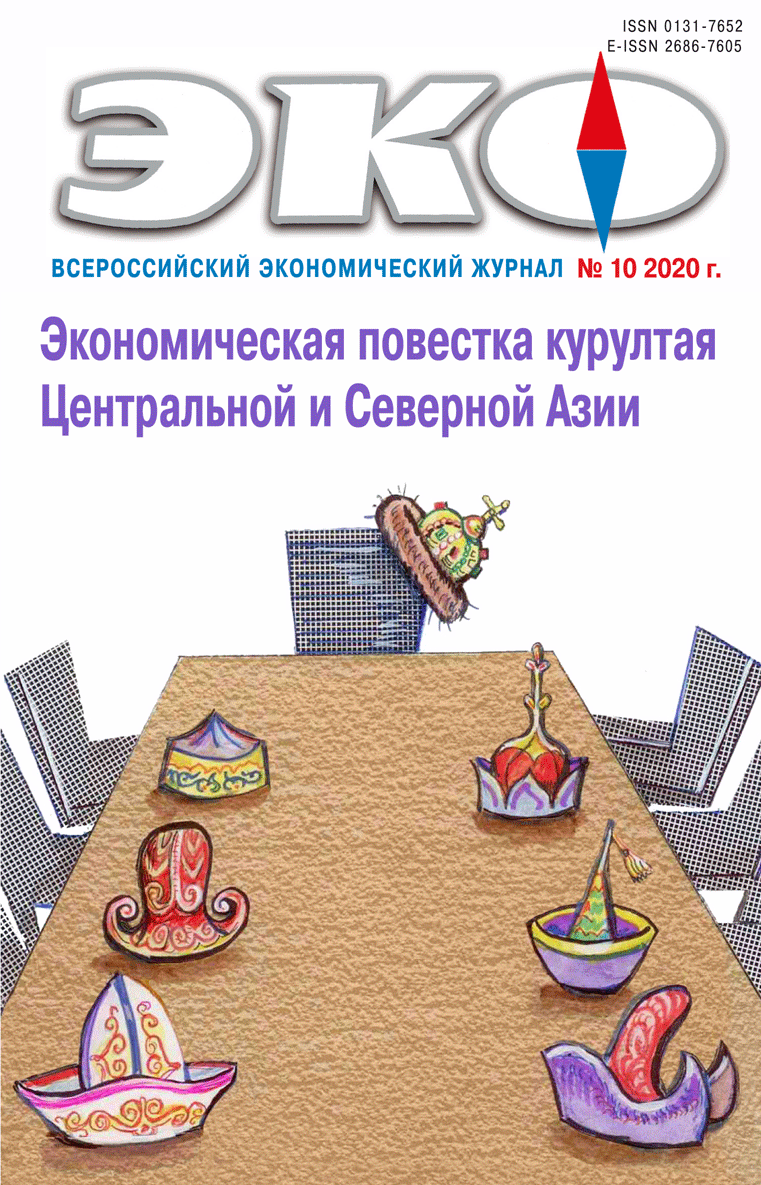Published 2020-10-02
Keywords
- new institutional economics (NIE),
- A. A. Auzan,
- original institutionalism of J. Commons,
- human nature,
- opportunistic behaviour
- institution,
- transaction,
- D. North,
- R. Coase,
- Coase theorem ...More
How to Cite
1.
Efimov В. Anti-Auzan: The Critique of a Social Philosophy. Part 2. ECO [Internet]. 2020 Oct. 2 [cited 2026 Feb. 24];50(10):168-92. Available from: https://ecotrends.ru/index.php/eco/article/view/4133
Abstract
John Commons emphasized that his institutional economics is based on the pragmatism of Charles Peirce as a research method and on the pragmatist philosophy of John Dewey in his vision of the subject of research. The rejection by the new institutional economics (NIE) of the pragmatist philosophy is the basis for its radical deformations of the conceptual apparatus of the original institutionalism. This concerns the vision of human nature, the concept of social institution, and the notion of transactions. This paper criticizes deformation of these concepts by NIE in the book “Economics of Everything. How institutions determine our life” by A. A. Auzan, the dean of the Department of Economics of Moscow State University. The critique is based on a modernized presentation of these concepts initially introduced in the institutional economics of J. Commons. A. A. Auzan, like many authors of textbooks of NIE, followed the path dependence of the profession of the Soviet “politeconomist”. Just as specialists in political economy of socialism relied on Marxism, which served as an ideology that created the Soviet social order, so A. A. Auzan tries to interpret the post-Soviet social order in terms of NIE, which reflects the ideology that gave rise to this order, i.e. the ideology of neoliberalism.References
- Акерлоф Дж., Крэнтон Р. Экономика идентичности. Как наши идеалы и социальные нормы определяют кем мы работаем, сколько зарабатываем и насколько несчастны. М.: Карьера Пресс. 2011.
- Алексеева Т. А. Современные политические теории. М.: РОССПЭН. 2000.
- Аузан А. А. Экономика всего. Как институты определяют нашу жизнь. М.: Манн, Иванов и Фербер, 2017.
- Барщевский М. Счастливы неимущие (Евангелие от Матвея). Судебный процесс Березовский – Абрамович, Лондон – 2011/12. М.: Издательский дом «Аргументы недели». 2017.
- Бергер П., Лукман Т. Социальное конструирование реальности. Трактат по социологии знания. М.: Медиум. 1995.
- Гребер Д. Долг: первые 5000 лет истории. М.: Ад. Маргинем Пресс. 2015.
- Дьюи Дж. Либерализм и социальные действия / Пер. В. Нагдасевой // Демократия и ХХ век: Хрестоматия по курсу гражданского образования для педагогических университетов. Нижний Новгород: Изд-во Нижегор. гуманитар. центра, 1997.
- Ефимов В. М. Предмет и метод интерпретативной институциональной экономики // Вопросы экономики. 2007. № 8. С. 49–67. URL: http://ecsocman.hse.ru/data/987/634/1219/Yefimov-8–07.pdf
- Ефимов В. М. Экономическая наука под вопросом: иная методология, история и исследовательские практики. М.: Курс: ИНФРА-М. 2016a. URL: http://ecsocman.hse.ru/data/2016/12/23/1251072856/efimov.pdf
- Ефимов В. М. Прошлое и будущее экономической науки с точки зрения прагматистской философии // Журнал экономической теории. 2016b. № 3. С. 50–63. URL: http://u55901.netangels.ru/content/zhurnal2017/JET/05iEfimovi3i16.pdf
- Кимлика У. Современная политическая философия. Введение. М.: ВШЭ. 2010.
- Коммонс Дж. Институциональная экономика // Terra Economicus. 2012. Т. 10. № 3. С. 69–76.
- Коуз Р. Фирма, рынок и право. М.: Новое издательство, 2007.
- Коуз Р. Очерки об экономической науке и экономистах. М.; СПб.: Издательство Института Гайдара. 2015.
- Розанваллон П. Утопический капитализм. История идеи рынка. М.: Новое литературное обозрение. 2007.
- Уильямсон О. И. Экономические институты капитализма. Санкт-Петербург: Лениздат. 1996.
- Тутов Л. А. и др. Философия и методология экономики. М.: ИНФРА-М. 2016.
- Berger P., Luckman T. The Social Construction of Reality. London: Penguin Books. 1991.
- Cassidy J. Coase and the Misuse of Economics // The New Yorker, September 3, 2013. URL: https://www.newyorker.com/news/john-cassidy/ronald-coase-and-the-misuse-of-economics
- Commons J. R. The Economics of Collective Action. New York: The Macmillan Company. 1950.
- Commons J. R. Institutional Economics. Its Place in Political Economy. New Brunswick: Transaction Publishers. 1990.
- Düppe T. Debreu’s apologies for mathematical economics after 1983 // Erasmus Journal for Philosophy and Economics. 2010. Vol. 3. Issue 1. P. 1–32.
- Heilbroner R. Behind the Veil of Economics: Essays in the Worldly Philosophy. New York, London: W. W. Norton & Co. 1988.
- Medema S. G. (2017). The Coase Theorem at Sixty. URL: https://www.aeaweb.org/articles?id=10.1257/jel.20191060&&from=f; URL: https://economie.esg.uqam.ca/wp-content/uploads/sites/54/2018/03/Medema_Steve_Mars2018.pdf.
- North D. C. Institutions, Institutional Change and Economic Performance. Cambridge: Cambridge University Press. 1990.
- Simon H. New Science of Management Decision. Englewood Cliffs, NJ: Prentice Hall. 1977.
- Stigler G. Memoirs of an Unregulated Economist. Chicago: University of Chicago Press. 1988.

